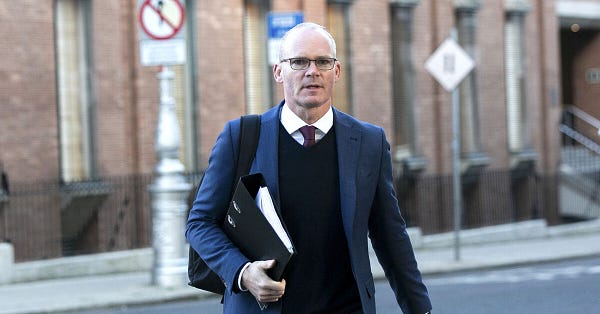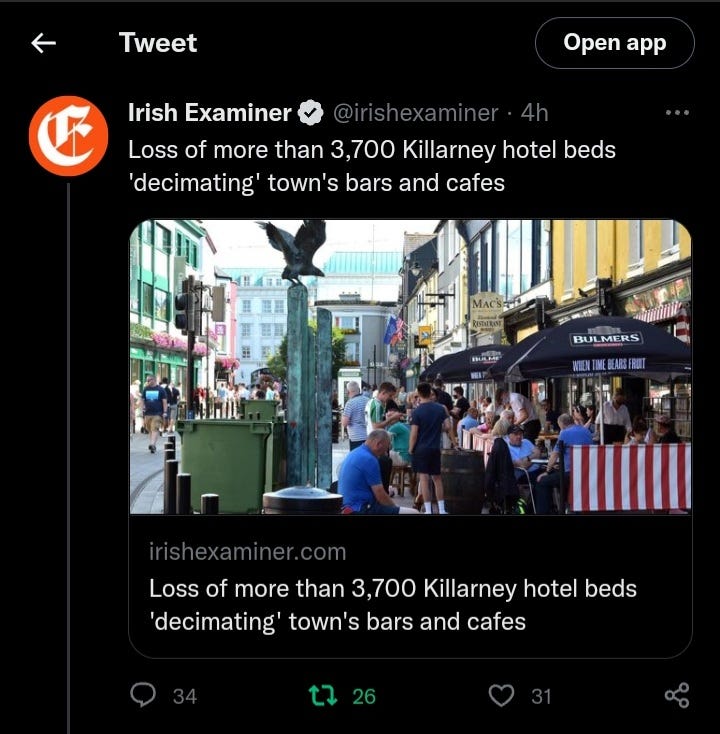'Cost of Living' double welfare payment was issued to those fleeing Ukraine
Irish State paid out at least €12 million in bumper week payout
Refugees fleeing Ukraine received at least €12 million in welfare payments issued by the Irish state last week.
The Department of Social Protection confirmed to this Substack on Monday that International Protection Refugees received double payments alongside Irish welfare recipients as part of the government’s Autumn Cost of Living budget measure.
Recipients of the standard €208 weekly welfare saw their payment double to €416.
This work is unpaid. Click to buy me a coffee!

Refugees receiving pensions also received double payments, as per the budgetary measures to help ease the cost of living for those facing increasing fuel, oil, gas, food and energy price rises.
It is worth noting that ‘people fleeing Ukraine’ is the umbrella term for all refugees arriving under the Temporary Protection Directive invoked by the European Commission last March.*
It provides for ‘Ukrainian nationals and residents and their family members, as well as non-Ukrainian nationals and stateless people legally residing in Ukraine who cannot return to their country or region of origin (such as asylum seekers or beneficiaries of international protection), and their family members.’
The Dáil heard four days ago that Ireland has welcomed some 60,000 people fleeing Ukraine, according to the Irish Independent:
“She (Sinn Fein leader Mary Lou McDonald) said the Irish people welcomed some 60,000 refugees from Ukraine and the system was already overwhelmed.”
The latest data available is from the CSO’s Arrivals from Ukraine series 6, which tells us that in September, there were 48,158 people living in hotel accommodation, where all bills and overheads are currently covered by the Irish state. A further 5,959 people fleeing Ukraine are currently living with hosts in family homes, according to the CSO.
The next CSO Arrivals from Ukraine (series 7) is due on November 14.
“People displaced from Ukraine will have received the Autumn Double Payment if they are receiving an eligible primary payment,” a department spokesperson said.
Under the temporary protection directive, people displaced from Ukraine are entitled to the full range of welfare supports on the same basis as any EU citizen.
“Jobseekers Allowance is paid at the weekly rate of €208 which will increase, under the Budget 2023 measures announced in September 2022, to €220 however, reduced rates apply in the case of individuals aged under 25,” a department spokesperson said.
“Autumn cost of living double payment will be paid to most people who get a weekly social welfare payment including all pensioners, carers and people on disability payments,” according to Budget 2023 measures.
Detrimental knock on effects on housing, health services and education are manifesting as services attempt to deal with the uncapped inflow of refugees.
Ireland’s homeless figures reached record levels this week, with 10,975 people in emergency accommodation, the highest number ever recorded. Some 3,343 of these are children.
The real figures is much higher however, according to an Irish Examiner report.
GP’s and hospitals are under pressure with 60,000 new arrivals availing of free medical treatment.
The blow to the tourist industry, with 25% of hotel rooms contracted out to refugees, is ‘decimating’ local businesses according to a report by Anne Lucey in the Irish Examiner.
There are an additional 11,000 refugee children enrolled in Irish schools, according to National Association of Principals and Deputy Principals (NAPD) President Rachel O’Connor.
“Additionally, in 2022, Irish primary and post-primary schools have taken in approximately 11,000 school-going Ukrainian refugees,” she said in a statement highlighting growing pressures on the profession.
“Our members and wider school communities have worked tirelessly to accommodate these new students and support them as they adjust to a new culture, a new language and a new education system.”
NAPD says one in five post primary principals are working sixty hours per week due to ‘administration overload.’
Meanwhile, Irish mortgage holders were hit this week with the third interest rate hike this year, diesel costs are soaring above €2 per litre and a ban on the sale of smoky coal and turf comes into effect on October 31.
The €12m figure outlined above is based on latest data provided by the CSO in their latest Arrivals From Ukraine series, released on Oct 3. As such, the calculations offered in this Substack are confirmed underestimates.
The CSO figures show 21,868 on ‘working age income supports’,
21868 x €416 social welfare double payment = €9,097,088
The CSO lists 17,518 child beneficiaries.
Since we know (from NAPD) that 11,000 children are in school, I’ve used the latest CSO school statistics (from the 21/22 academic year) to categorise child beneficiary payments according to the available percentage: 71% primary and 29% post primary.
As dependents on a weekly social welfare claim, child beneficiaries receive €40 while over 12’s receive €48.
17, 518 - 11,000 =6,518 (Non school going Under 12 x €80 double payment) = €521,440
Calculated 71% of primary age children = 7,810 x €80 double payment = €624,800
Calculated 29% of post primary children = 3,190 x €96 double payment = €306,240
Plus pensions / other payments 2652 claimants = €1,343, 503.20
Total €11,893,071
The arrivals figures have grown substantially since September, hence it is safe to estimate the real figure is at least €12 million.
A total of 1.4 million recipients received the Autumn Cost of Living double payment issued to those on social welfare last week.
Earlier this week, a young Ukrainian mother told Newstalk FM yesterday that she felt Irish benefits were too generous.
“I was getting €208 per week, plus child benefit each week. I actually thought this would be a monthly payment, but I was shocked when I found out it was weekly,” she said.


Yesterday, the government moved to tighten up benefits issued to people from Ukraine and elsewhere and undertook to conduct a comparison on how the directive on temporary protection is applied in other EU states. Those fleeing Ukraine will be asked to pay for their own food and transport.
New government measures introduced yesterday doubled the monthly payment from €400 to €800 to those accommodating refugees in private homes, from December 1. It is not clear if a homeowner can legally ask their guest to contribute to food, energy, heating and internet costs while under contract for this monthly payment.
On the same day, Irish Independent residential property editor Mark Keenan asked Irish people ‘to pull the finger out and make substantive personal and collective sacrifices for what is right,’ under a headline that tells us it’s time to ‘Stand Up and Be Counted.’
But surely to stand up and be counted means homeowners should receive the same price per night as hotel operators? The figure, from reliable sources here in Lisdoonvarna, is understood to be €100 per night.
Back in August, we learned that 90 government contracts worth €99.3m had been signed for hotels across the country to provide accommodation and services such as catering, cleaning and laundry for 32,000 arrivals, according to tender documents published by the Department of Integration.
Since the number of arrivals has effectively almost doubled, how much are such contracts worth now?
In April, the government committed to spending €3billion on Ukrainian refugees, according to RTE news.
Where is this money coming from? Is the Irish state being reimbursed - even partially - by the European Commission, which invoked the Temporary Protection Directive last March?
On this, the day after the death announcement of Cervical Check campaigner Lynsey Bennett (34) it is worth noting that there was no alternative but to cut basic public services in place to save lives following the fallout of the bank crash a decade ago.
Irish labs testing cervical smears were closed and the service outsourced to the US.
Mother of two Lynsey Bennet was diagnosed with an invasive form of cervical cancer in 2017, following the alleged misinterpretation of smear slides.
In 2021, she settled a case she took against the HSE and various other parties.
Her fight to secure her two daughters’ financial future moved the Irish nation to tears last year when she spoke about their growing up without her.
“To my daughters Zoe and Hayley I hope I have done enough to secure you both a future free from financial worries and that even with me not here to guide you, that you can both pursue your dreams and remember, Mammy loves you.”

On the day of Bennett’s passing, the government published its Hate Speech Bill.
“The new legislation will criminalise any intentional or reckless communication or behaviour that is likely to incite violence or hatred against a person or persons because they are associated with a protected characteristic.
The penalty for this offence will be up to five years' imprisonment.
Could this Substack be considered Hate Speech under the new legislation due to come into effect before the end of the year? Could the publication of facts be deemed offensive to certain groups?
On Monday Taoiseach Micheál Martin used the term ‘far right’ in an apparent effort to shut down justified questioning of chaotic government policy on uncapped immigration.
Since I am unaware of any concrete definition for the term ‘far right’ I have asked the Taoiseach’s department via it’s press office to please define this term and I await a response.
This work is unpaid! If you appreciate it you can buy me a coffee
*The Temporary Protection Directive was invoked by the European Commission last March. Under the Temporary Protection Directive Refugees with International Protection status are entitled to:
Get a job without needing a work permit or any other permission
Open a business, or work in a trade or profession
Access education and training
Get the same medical care and apply for the same social welfare and housing supports as an Irish citizen
Live in Ireland for 3 years (which can then be renewed). Programme refugees may be granted permission to live in Ireland for a shorter period.
Apply for a travel document
Leave and re-enter Ireland (if you have a travel document)
Apply for family reunification for your family to join you in Ireland
Refugees can apply for Irish citizenship after 3 years or residence. If you have subsidiary protection status or permission to remain, you can apply after 5 years, according to Citizens Information:












